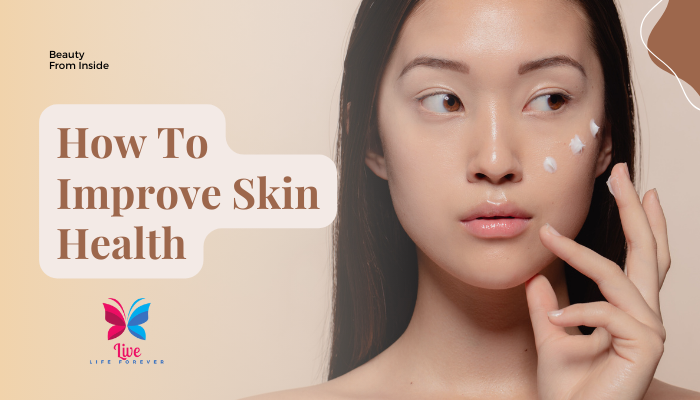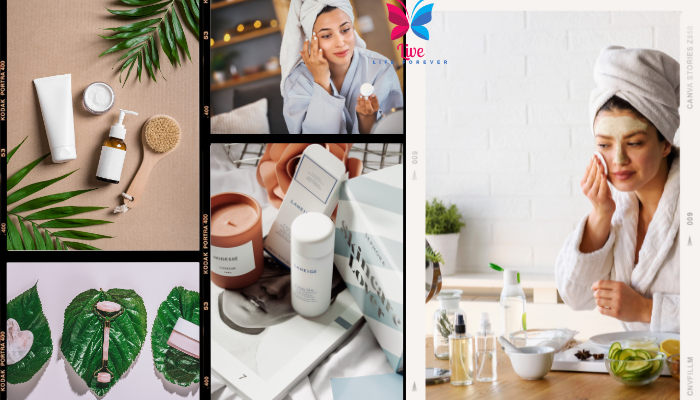How To Improve Skin Health- Ultimate Guide to Achieving Radiant and Healthy Skin

How To Improve Skin Health

Introduction
Our skin is the largest organ of our body, and it plays a crucial role in protecting us from harmful environmental factors while also reflecting our overall health and well-being. Achieving radiant, healthy skin is a goal that many of us strive for, but it can be a challenging task in today’s fast-paced world, where stress, poor diet, and environmental pollutants can take a toll on our skin’s appearance and condition.
In this comprehensive guide, we’ll explore a wide range of tips, tricks, and scientifically backed strategies to help you improve your skin health and achieve the glowing complexion you’ve always desired. From understanding the importance of a balanced diet and proper hydration to identifying the best skincare products and addressing specific skin concerns, this article will equip you with the knowledge and tools you need to embark on a transformative journey toward healthier, more radiant skin.
The Importance of a Balanced Diet for Healthy Skin
When it comes to achieving healthy skin, the old adage “you are what you eat” holds true. A balanced, nutrient-rich diet can have a profound impact on the appearance and condition of your skin. Here’s how a well-rounded diet can benefit your skin health:
- Antioxidants: Consuming a diet rich in antioxidants from fruits, vegetables, and whole grains can help protect your skin from oxidative stress caused by free radicals, which can lead to premature aging and damage.
- Omega-3 Fatty Acids: These essential fatty acids, found in foods like fatty fish, walnuts, and flaxseeds, can help reduce inflammation and improve skin hydration, resulting in a suppler, more radiant complexion.
- Vitamins A, C, and E: These vitamins are crucial for maintaining skin health. Vitamin A promotes cell turnover, vitamin C boosts collagen production, and vitamin E protects skin from environmental stressors.
- Zinc and Selenium: These minerals play a vital role in wound healing, preventing acne, and maintaining skin elasticity.
By incorporating a variety of nutrient-dense foods into your diet, such as leafy greens, berries, avocados, nuts, and lean proteins, you’ll be providing your skin with the essential building blocks it needs to thrive.
The Importance of Proper Hydration for Healthy Skin
Proper hydration is another key factor in achieving and maintaining healthy, radiant skin. Water makes up a significant portion of our skin’s composition, and dehydration can lead to a dull, dry, and lackluster complexion. Here’s why staying hydrated is crucial for your skin’s well-being:
- Increased Elasticity: Adequate hydration helps keep your skin supple and elastic, reducing the appearance of fine lines and wrinkles.
- Improved Circulation: Drinking enough water promotes better blood circulation, which ensures that vital nutrients and oxygen are delivered to your skin cells.
- Toxin Elimination: Water aids in the elimination of toxins and waste products from your body, which can contribute to a clearer, more radiant complexion.
- Skin Barrier Function: Proper hydration supports the skin’s natural barrier function, preventing moisture loss and protecting against environmental stressors.
Aim to drink at least eight glasses of water per day, and consider incorporating water-rich fruits and vegetables, such as cucumbers, watermelon, and tomatoes, into your diet for an additional hydration boost.

Choosing the Right Skincare Products
With so many skincare products on the market, it can be overwhelming to determine which ones are best suited for your skin type and concerns. Here are some tips for choosing the right skincare products:
- Understand Your Skin Type: Identify whether your skin is dry, oily, combination, sensitive, or normal, and select products formulated specifically for your skin type.
- Ingredients Matter: Look for products that contain beneficial ingredients like vitamin C, retinol, hyaluronic acid, and alpha-hydroxy acids, which can target specific skin concerns such as fine lines, hyperpigmentation, and dullness.
- Consult with a Dermatologist: If you have persistent skin issues or concerns, consider seeking advice from a dermatologist who can recommend medical-grade skincare products tailored to your individual needs.
- Read Reviews and Research: Before investing in new skincare products, read reviews from trusted sources and research the brand’s reputation and product efficacy.
- Patch Test: Always perform a patch test on a small area of skin before incorporating a new product into your routine to ensure you don’t have any adverse reactions.
Remember, consistency is key when it comes to seeing results from your skincare routine. Give new products time to work, and be patient as your skin adjusts to the changes.
Addressing Specific Skin Concerns
While a balanced diet, proper hydration, and the right skincare products can contribute to overall skin health, some individuals may need to address specific skin concerns. Here are some common skin issues and strategies for tackling them:
- Acne: Incorporate products with salicylic acid or benzoyl peroxide to help unclog pores and reduce inflammation. Maintain a consistent skincare routine and consider seeking advice from a dermatologist for persistent or severe acne.
- Fine Lines and Wrinkles: Look for products containing retinol, vitamin C, or alpha-hydroxy acids, which can help stimulate collagen production and improve skin texture. Additionally, be diligent about sun protection and hydration.
- Hyperpigmentation: Ingredients like vitamin C, kojic acid, and licorice root extract can help brighten the skin and reduce the appearance of age spots and discoloration. Exfoliation and sun protection are also crucial.
- Dullness and Uneven Skin Tone: Incorporate products with alpha-hydroxy acids or enzymes to help slough off dead skin cells, revealing a brighter, more radiant complexion.
- Sensitivity and Redness: Choose gentle, fragrance-free products and avoid harsh exfoliants or irritating ingredients. Consider incorporating soothing ingredients like aloe vera, chamomile, and green tea to calm inflammation.
Remember, addressing specific skin concerns may require a combination of lifestyle changes, targeted skincare products, and, in some cases, professional treatments or guidance from a dermatologist.

The Importance of Sun Protection
Protecting your skin from the harmful effects of UV radiation is crucial for maintaining healthy, youthful-looking skin. Exposure to UV rays can lead to premature aging, wrinkles, age spots, and an increased risk of skin cancer. Here are some tips for effective sun protection:
- Use Broad-Spectrum Sunscreen: Look for sunscreens that offer broad-spectrum protection against both UVA and UVB rays, with an SPF of at least 30.
- Reapply Regularly: Sunscreen should be reapplied every two hours, or more frequently if you’re swimming or sweating.
- Seek Shade: When possible, seek shade, especially during peak sun hours between 10 a.m. and 4 p.m.
- Wear Protective Clothing: Invest in lightweight, long-sleeved shirts, pants, and wide-brimmed hats to provide additional coverage from the sun’s rays.
- Avoid Tanning Beds: Tanning beds emit harmful UV radiation and can significantly increase your risk of skin cancer and premature aging.
By incorporating sun protection into your daily routine, you’ll not only be safeguarding your skin from damage, but you’ll also be taking proactive steps toward maintaining a youthful, radiant complexion for years to come.
Lifestyle Factors That Impact Skin Health
While diet, hydration, and proper skincare are essential for achieving healthy skin, there are other lifestyle factors that can also play a significant role. Here are some aspects to consider:
- Stress Management: Chronic stress can lead to increased inflammation, which can exacerbate skin conditions like acne, eczema, and psoriasis. Incorporate stress-relieving activities like yoga, meditation, or deep breathing exercises into your routine.
- Sleep Quality: Adequate sleep is crucial for skin health, as it allows your body to repair and regenerate skin cells. Aim for 7-9 hours of quality sleep each night.
- Exercise: Regular physical activity can improve blood circulation, which delivers oxygen and nutrients to your skin cells, promoting a healthy glow.
- Smoking and Alcohol Consumption: Both smoking and excessive alcohol consumption can dehydrate the skin and accelerate the aging process. Limit or avoid these habits for better skin health.
- Environmental Factors: Exposure to pollution, harsh weather conditions, and excessive heat or cold can all take a toll on your skin. Protect your skin with appropriate clothing, moisturizers, and antioxidant-rich products.
By addressing these lifestyle factors and making positive changes, you’ll not only improve the appearance of your skin but also promote overall health and well-being.
Frequently Asked Questions (FAQs)
Q: How long does it take to see results from a new skincare routine?
A: It can take anywhere from 4 to 8 weeks to start seeing noticeable improvements in your skin’s appearance and condition when incorporating new products or lifestyle changes. Be patient and consistent with your routine.
Q: Can drinking more water really improve my skin?
A: Yes, proper hydration is essential for maintaining healthy, radiant skin. Water helps flush out toxins, improve circulation, and keep your skin supple and plump.
Q: Is it better to use a separate sunscreen or choose a moisturizer with SPF?
A: While moisturizers with SPF can be convenient, it’s generally recommended to use a separate, broad-spectrum sunscreen to ensure adequate protection from UV rays.
Q: Can certain foods cause acne or other skin problems?
A: While there is no definitive link between specific foods and acne, some individuals may find that their skin reacts to certain food items like dairy, processed foods, or foods high in sugar or refined carbs.
Q: Is it necessary to splurge on expensive skincare products?
A: Not necessarily. While high-end products can be effective, there are also many affordable drugstore options that can deliver excellent results when used consistently and as part of a well-rounded skincare routine.
Q: How can I tell if a product is causing an adverse reaction?
A: If you experience redness, itching, burning, or any other form of irritation after using a new skincare product, discontinue use and consult with a dermatologist if symptoms persist.
Conclusion
Achieving radiant, healthy skin requires a holistic approach that combines a balanced diet, proper hydration, the right skincare products, sun protection, and a healthy lifestyle. By following the tips and strategies outlined in this guide, you’ll be well on your way to unveiling your best skin yet.
Remember, patience and consistency are key when embarking on a journey toward better skin health. Celebrate small victories along the way, and don’t hesitate to seek professional advice from a dermatologist if you encounter persistent or severe skin concerns.
With dedication and a commitment to nourishing your skin from the inside out, you’ll not only enhance your outward appearance but also cultivate a sense of confidence and well-being that radiates from within.




